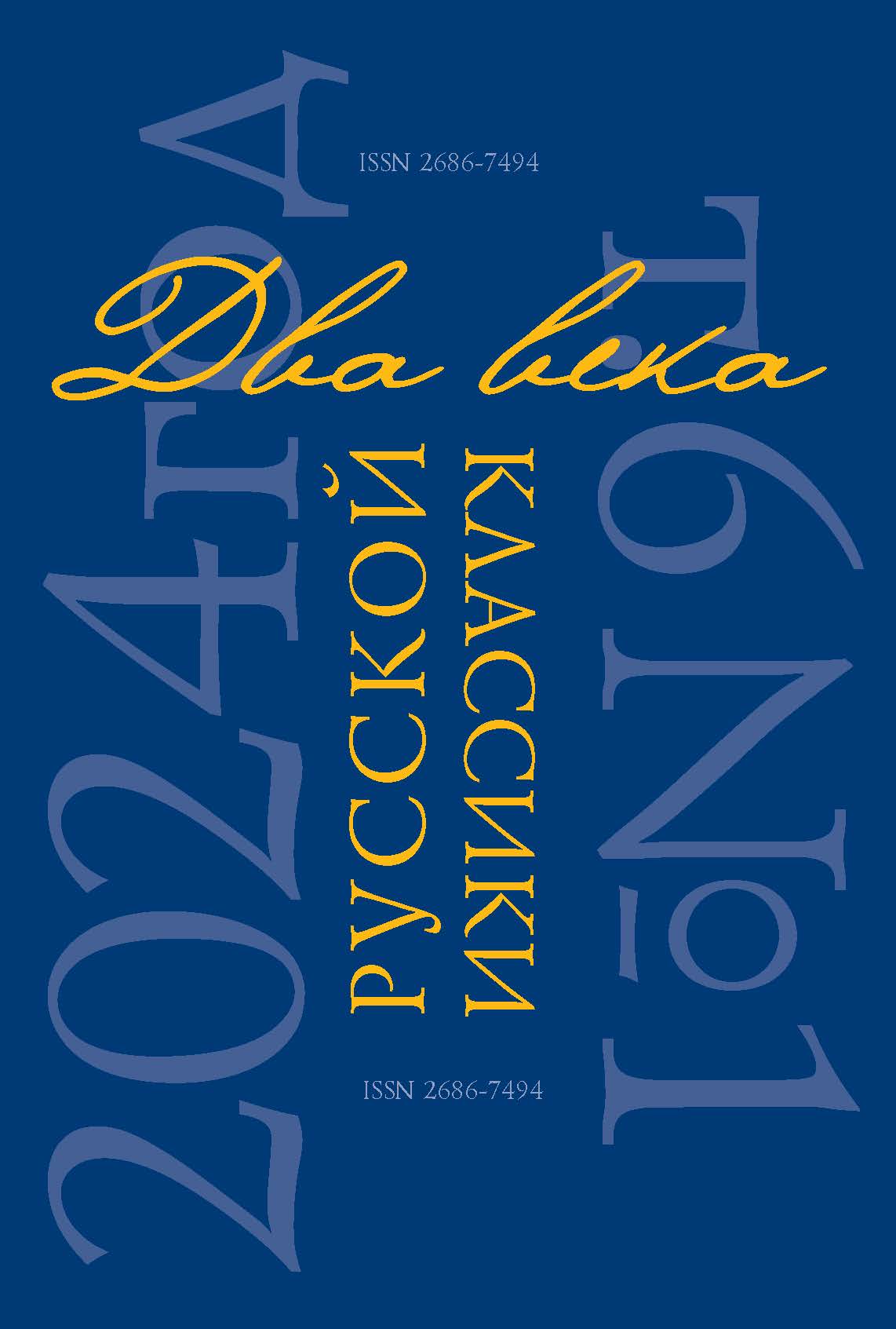Acknowledgments:
The study was supported by the Russian Foundation for Basic Research (RFBR), number 20-012-00102.
Abstract:
The article analyzes the nature of the interaction between first-line literature and fiction in the 1860–1870s as dynamic, versatile and dialogical. It is argued that the historical novel by E. A. Salias “The Pugachevites” (1874), based on the discoveries of the epic novel “War and Peace” by L. N. Tolstoy, testified to the process of strengthening the epic tendency in Russian literature of the 19th century. The novel by E. A. Salias was not exclusively secondary, the portrayal of the “predatory type” hero became innovative, but not deeply understood by the fiction writer. It is noted that further development was undertaken by F. M. Dostoevsky at the first stage of the creation of the novel “The Adolescent”. Its distinctive feature was the consideration of the “predatory type” in the context of the Russian history of spiritual quests of the 17th–19th centuries. The description of the stages of development of the type by F. M. Dostoevsky made it possible to come to the conclusion that the process of cognition of the Russian character, the identification of the laws of the historical development of Russia presupposed a versatile comprehension of the national foundations of life, which predetermined the epic character as the leading feature of the Russian novel of the second half of the 19th century.
References
Andreeva, V. G. O natsional’nom svoeobrazii russkogo romana vtoroi poloviny XIX veka [On the National Identity of the Russian Novel of the Second Half of the 19th Century]. Kostroma, KGU Publ., 2016. 492 p. (In Russ.)
Bakhtin, M. M. “Epos i roman” [“Epic Poem and Novel”]. Bakhtin M. M. Voprosy literatury i estetiki [Literature and Aesthetics Issues]. Moscow, Khudozhestvennaia literatura Publ., 1975, pp. 447‒483. (In Russ.)
Budanova, N. F. “I svet vo t’me svetit...” (K kharakteristike mirovozzreniia i tvorchestva pozdnego Dostoevskogo) [“And the Light Shines in the Darkness ...” (On the Characterization of the Worldview and Creativity of Dostoevsky in His Late Period)]. St. Petersburg, Petropolis Publ., 2012. 408 p. (In Russ.)
Viktorovich, V. A., Man’kova, L. V., Penskaia, E. N. “Salias-de-Turnemir” [“Salias de Tournemire”]. Russkie pisateli 1800–1917 [Russian writers 1800–1917], ed. by P. A. Nikolaev. Moscow, Bol’shaia Rossiyskaya Entsiklopediia Publ., 2007, pp. 456–461. (In Russ.)
Lebedev, Yu. V. “U istokov dialoga epicheskikh romanov v zhurnale ‘Russkii vestnik’ (I. S. Turgenev i B. M. Markevich)’.” [“At the Origins of the Dialogue of Epic Novels in the Journal ‘Russian Bulletin’ (I. S. Turgenev and B. M. Markevich)”]. Dva veka russkoi klassiki, vol. 3, no. 3, 2021, pp. 22–51. https://doi.org/10.22455/2686-7494-2021-3-3-22-51 (In Russ.)
Letopis’ zhizni i tvorchestva F. M. Dostoevskogo. 1821–1881: v 3 t. [Chronicle of the Life and Work of F. M. Dostoevsky. 1821–1881: in 3 vols.]. St. Petersburg, Akademicheskii proekt Publ., 1999, vol. 2. 593 p. (In Russ.)
Saisu, N. Obraz nastavnika v tvorchestve F. M. Dostoevskogo kontsa 1860-kh — nachala 1870-kh gg.: sv. Tikhon Zadonskii, K. E. Golubov [The Image of a Mentor in the Works of F. M. Dostoevsky in the Late 1860s – Early 1870s: St. Tikhon Zadonsky, K. E. Golubov: PhD Dissertation]. St. Petersburg, 2020. 194 p. (In Russ.)
Tikhomirov, B. N. “…Ia zanimaius’ etoi tainoi, ibo khochu byt’ chelovekom”: stat’i i esse o Dostoevskom [“...I am Engaged in this Secret, Because I Want to Be Human”: Articles and Essays about Dostoevsky]. St. Petersburg, Serebrianyi vek Publ., 2012. 500 p. (In Russ.)
Fridlender, G. M. “U istokov pochvennichestva (F. M. Dostoevskii i zhurnal ‘Svetoch’)” [“At the Source of Pochvennichestvo (F. M. Dostoevsky and the Journal ‘Svetoch’)”]. Izvestiia RAN. Seriia literatury i iazyka. Moscow, AN SSSR Publ., 1971, vol. 3 (5), pp. 400–410. (In Russ.)
Fridlender, G. M. Dostoevskii i mirovaia literature [Dostoevsky and World Literature]. Moscow, Khudozhestvennaia literatura Publ., 1979. 423 p. (In Russ.)









